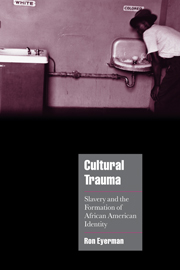Book contents
- Frontmatter
- Contents
- Acknowledgments
- 1 Cultural trauma and collective memory
- 2 Re-membering and forgetting
- 3 Out of Africa: the making of a collective identity
- 4 The Harlem Renaissance and the heritage of slavery
- 5 Memory and representation
- 6 Civil rights and black nationalism: the post-war generation
- Notes
- List of references
- Index
- Cambridge Cultural Social Studies
4 - The Harlem Renaissance and the heritage of slavery
Published online by Cambridge University Press: 22 September 2009
- Frontmatter
- Contents
- Acknowledgments
- 1 Cultural trauma and collective memory
- 2 Re-membering and forgetting
- 3 Out of Africa: the making of a collective identity
- 4 The Harlem Renaissance and the heritage of slavery
- 5 Memory and representation
- 6 Civil rights and black nationalism: the post-war generation
- Notes
- List of references
- Index
- Cambridge Cultural Social Studies
Summary
He scans the world with calm and fearless eyes,
Conscious within of powers long since forgot;
At every step, now man-made barriers rise
To bar his progress–but he heeds them not.
He stands erect though tempests round him crash,
Though thunder burst and billows surge and roll;
He laughs and forges on, while lightnings flash
Along the rocky path to his goal.
Impassive as a Sphinx, he stares ahead–
Foresees new empires rise and old ones fall;
While caste-mad nations lust for blood to shed,
He sees God's finger writing on the wall.
With soul awakened, wise and strong he stands,
Holding his destiny in his hands.
“The New Negro” by J. E. McCall (Opportunity Magazine 1927)Someone is always at my elbow reminding me that I am a granddaughter of slaves. It fails to register depression with me. Slavery is sixty years in the past. The operation was successful and the patient is doing well, thank you. The terrible struggle that made an American out of a potential slave said “On the line!” The Reconstruction said “Get set!”; and the generation before me said “Go!” I am off to a flying start and I must not halt in the stretch to look behind and weep. Slavery is the price I paid for civilization, and the choice was not with me. It is a bully adventure and worth all that I paid through my ancestors for it.
(Hurston 1928, quoted in Watson 1995)- Type
- Chapter
- Information
- Cultural TraumaSlavery and the Formation of African American Identity, pp. 89 - 129Publisher: Cambridge University PressPrint publication year: 2001

